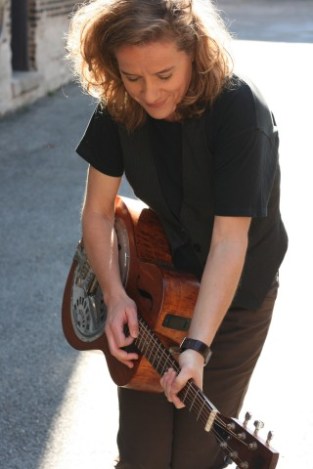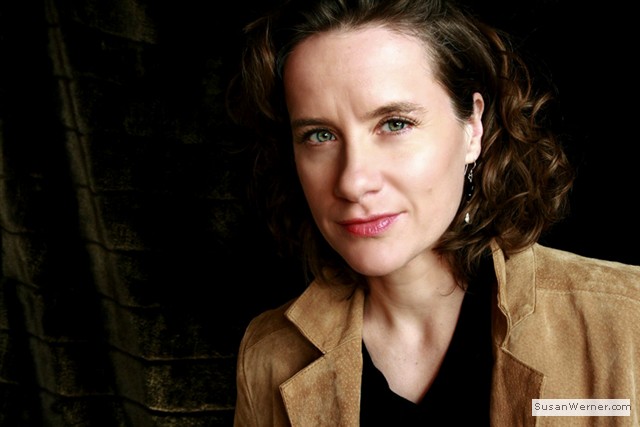 Standing in the spotlight at the quaint Thrasher Opera House in rural Green Lake, Wis., clad in a sleeveless plaid cotton shirt and jeans, cradling an acoustic guitar, Susan Werner could pass for a folk or country singer cut from old cloth. That she was a farm girl herself, and her audience is made up mostly of farmers, only adds to that impression: The uninitiated might expect songs about lost love, lost teeth, tight jeans, or a swig of whiskey whetting away the Dust Bowl days.
Standing in the spotlight at the quaint Thrasher Opera House in rural Green Lake, Wis., clad in a sleeveless plaid cotton shirt and jeans, cradling an acoustic guitar, Susan Werner could pass for a folk or country singer cut from old cloth. That she was a farm girl herself, and her audience is made up mostly of farmers, only adds to that impression: The uninitiated might expect songs about lost love, lost teeth, tight jeans, or a swig of whiskey whetting away the Dust Bowl days.
But then Werner leans in toward the mic and in a clear, strong voice, elicits hoots and applause from the audience with the tongue-in-cheek “Herbicides.”
Skies of blue and fields of green, waterfalls of Atrazine
Hundred acres to explore, acres of Alachlor
Hey, hey, ho, ho, mom and dad how could they know
Ho, ho, hey, hey, herbicides done made me gay
Dubbed the “Empress of the Unexpected” by NPR, Werner, 48, takes on farming chemicals, climate change, drought, and the changing farm landscape in the vein of ‘60s folksters who rallied against Vietnam and government wrongs — musicians like Dylan, Mitchell, and Baez. And while she has been on the music scene since the early 1990s, her music has caught on recently with both a new generation of farmers and older ones, who fill the small theaters and opera houses to hear her perform.
While her work goes down easier on the East Coast, “where I’m preaching to the converted,” Werner says delivering her message to more rural audiences is like “wheeling in the Trojan Horse.” Sometimes she manages to pull people under her spell. Still, she’s aware she will always “piss someone off in Des Moines” where criticism of herbicides and GMOs are threats to people’s livelihoods.
Werner, who grew up on a farm near Manchester, Iowa, has for the past two years been quietly writing about the sustainability movement and her own grief upon learning that her parents would be moving off the family farm. But her latest album, Hayseed, which pulls together a lot of her work on these topics, has put her in the spotlight, bringing with it an unexpected notoriety.
People are relating to her message, she says. They sing along with the songs and line up after performances to thank her for paying homage to farmers and farming. They talk to one another about changing crops, the trials of going organic, funding, how they’re changing what they eat. Many of them helped fund Hayseed, which was commissioned by the University of Nebraska’s Lied Center for the Performing Arts and the Institute for Agricultural Resources, but paid for largely through a campaign on the crowd-funding site PledgeMusic. Donations came in from around the world, and contributors got premiums such as autographed ears of corn and hog nose rings. Werner is donating 10 percent of sales to sustainable farming organizations.
The new farm movement, Werner says, is going “kaboom!” Young people are longing for a connection with something tangible. “Amid all the tweets and vines they are looking to connect with heritage, food, place — what is real. What is more real than farming?”
Take Mat and Danielle Boerson, who came to see Werner perform in Green Lake. Five years ago, the couple, both in their 30s, decided to nix their careers and instead start up the 80-acre Boerson Farm, one of the first organic farms in East Central Wisconsin. Friends associated with the Thrasher Opera House told the Boerson’s about Hayseed and its mission.
“What she is doing with the Hayseed project is very much in line with our farm and what we’re seeking to do,” Mat says. “She’s bringing a critical look at issues we’re facing as a society in light, approachable, and fantastic music.”
The venues Werner plays are often small. She frequently travels to gigs via back roads in a van with her road manager. When arriving in a town, the first place she hits is the local farmers market. During performance she acknowledges local producers, often tossing fresh veggies — a bean here, a kholrabi here in Green Lake — into the audience. At the conclusion of one performance, she jumped into the Hudson River.
Werner, however, is not to be taken lightly. Her songs, reviewers have said, will likely go into the Great American Songbook with the likes of Woody and Arlo Guthrie. She began singing at age 5, playing the guitar and piano by 11. Werner majored in voice at the University of Iowa (“where people smoked clove cigarettes and recited poetry — but not me!”) and studied opera, earning a master’s at Temple University. After graduation, she played and sang with jazz quartets along the East Coast and played her own songs in coffee houses. Upon hearing the confessional folk songs by musician Nanci Griffith, Werner found her passion.
What the future holds for Werner remains elusive, she says. At least six months of the Hayseed tour stretches before her. An offer to write a broadway musical awaits in the wings. She’s even considering going back into farming.
For now, however, she’s content to travel from town to town, delivering her message, entertaining hard-working farmers and hearing their stories. “I’m just a small town Iowa farm girl riding the wave,” she says — the wave of fresh interest that’s washing over the landscape of cornfields and pastures.
And you can believe Werner sits on its crest, tossing string beans, ears of corn, and barbs as it sweeps past. Her show, she warns, is no Prairie Home Companion. “I’ve pissed them off in Nebraska, too!”
Here’s the audio of “Herbicides,” just for yuks:



